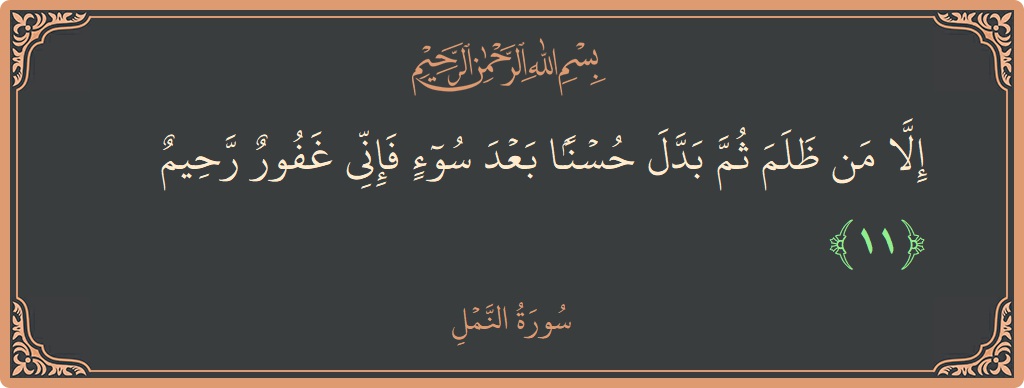Surah An-Naml: Verse 11 - إلا من ظلم ثم بدل... - English
Tafsir of Verse 11, Surah An-Naml
English Translation
Otherwise, he who wrongs, then substitutes good after evil - indeed, I am Forgiving and Merciful.English Transliteration
Illa man thalama thumma baddala husnan baAAda sooin fainnee ghafoorun raheemunTafsir of Verse 11
إِلَّا مَن ظَلَمَ ثُمَّ بَدَّلَ حُسْنًا بَعْدَ سُوءٍ فَإِنِّي غَفُورٌ رَّحِيمٌ ﴿11﴾
Except him who did wrong, then after (doing) evil replaced (it) with good, then I am Most-Forgiving, Very-Merciful. 27:11
The miracle of the staff of Sayyidna Musa (علیہ السلام) was mentioned in the verse prior to this, where it was also stated that when the staff turned into serpent, Sayyidna Musa (علیہ السلام) himself started running out of fear. The other miracle of illuminative hand of Sayyidna Musa (علیہ السلام) is related in the verse next to above referred verse. Then why this exception is mentioned in between two verses relating to miracles, and whether this exception is snapped from the subject (munqati`) or is it adjoining (muttasil)? The commentators have different view points on this subject. Some have declared it as snapped from the subject. In that case the verse will read as that in the previous verse it was stated that messengers do not get frightened, then it was also mentioned, by the way, as to who are the ones who should get frightened. They are those who have committed any sin, but later repented and sought Allah's pardon and performed good deeds. Although Allah Ta’ ala would pardon their sins, but even then there would be possibility of traces of sins being left over. It is for this reason that they always remain fearful of Allah. But If the exception is regarded adjoining with the subject, then the meaning of the verse would be that Allah's messengers do not get frightened except those who have committed some trifle or minor mistake and have repented on that. In that situation such trifle sins are forgiven. But the actual position is that even if there were some minor slips by the messengers, they were not regarded as sins - neither small nor big. Although they looked like sins but factually they were errors of ijtihad. According to this interpretation, this exception is an allusion toward the incident of the Egyptian who was killed by Sayyidna Musa (علیہ السلام) by error of judgment. Although this error was pardoned by Allah Ta’ ala, yet its effect remained with Musa I leaving some fear of the incident. Had this incident not have occurred, there would not have been any fear of the sort.
